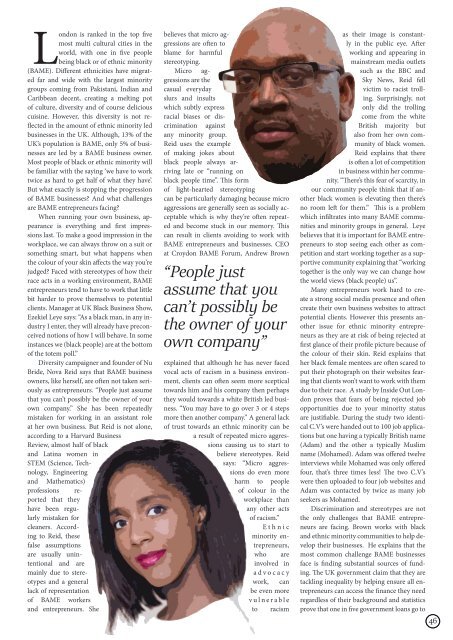Turnover Magazine
You also want an ePaper? Increase the reach of your titles
YUMPU automatically turns print PDFs into web optimized ePapers that Google loves.
London is ranked in the top five<br />
most multi cultural cities in the<br />
world, with one in five people<br />
being black or of ethnic minority<br />
(BAME). Different ethnicities have migrated<br />
far and wide with the largest minority<br />
groups coming from Pakistani, Indian and<br />
Caribbean decent, creating a melting pot<br />
of culture, diversity and of course delicious<br />
cuisine. However, this diversity is not reflected<br />
in the amount of ethnic minority led<br />
businesses in the UK. Although, 13% of the<br />
UK’s population is BAME, only 5% of businesses<br />
are led by a BAME business owner.<br />
Most people of black or ethnic minority will<br />
be familiar with the saying ‘we have to work<br />
twice as hard to get half of what they have’.<br />
But what exactly is stopping the progression<br />
of BAME businesses? And what challenges<br />
are BAME entrepreneurs facing?<br />
When running your own business, appearance<br />
is everything and first impressions<br />
last. To make a good impression in the<br />
workplace, we can always throw on a suit or<br />
something smart, but what happens when<br />
the colour of your skin affects the way you’re<br />
judged? Faced with stereotypes of how their<br />
race acts in a working environment, BAME<br />
entrepreneurs tend to have to work that little<br />
bit harder to prove themselves to potential<br />
clients. Manager at UK Black Business Show,<br />
Ezekiel Leye says: “As a black man, in any industry<br />
I enter, they will already have preconceived<br />
notions of how I will behave. In some<br />
instances we (black people) are at the bottom<br />
of the totem poll.”<br />
Diversity campaigner and founder of Nu<br />
Bride, Nova Reid says that BAME business<br />
owners, like herself, are often not taken seriously<br />
as entrepreneurs. “People just assume<br />
that you can’t possibly be the owner of your<br />
own company.” She has been repeatedly<br />
mistaken for working in an assistant role<br />
at her own business. But Reid is not alone,<br />
according to a Harvard Business<br />
Review, almost half of black<br />
and Latina women in<br />
STEM (Science, Technology,<br />
Engineering<br />
and Mathematics)<br />
professions reported<br />
that they<br />
have been regularly<br />
mistaken for<br />
cleaners. According<br />
to Reid, these<br />
false assumptions<br />
are usually unintentional<br />
and are<br />
mainly due to stereotypes<br />
and a general<br />
lack of representation<br />
of BAME workers<br />
and entrepreneurs. She<br />
believes that micro aggressions<br />
are often to<br />
blame for harmful<br />
stereotyping.<br />
Micro aggressions<br />
are the<br />
casual everyday<br />
slurs and insults<br />
which subtly express<br />
racial biases or discrimination<br />
against<br />
any minority group.<br />
Reid uses the example<br />
of making jokes about<br />
black people always arriving<br />
late or “running on<br />
black people time”. This form<br />
of light-hearted stereotyping<br />
can be particularly damaging because micro<br />
aggressions are generally seen as socially acceptable<br />
which is why they’re often repeated<br />
and become stuck in our memory. This<br />
can result in clients avoiding to work with<br />
BAME entrepreneurs and businesses. CEO<br />
at Croydon BAME Forum, Andrew Brown<br />
“People just<br />
assume that you<br />
can’t possibly be<br />
the owner of your<br />
own company”<br />
explained that although he has never faced<br />
vocal acts of racism in a business environment,<br />
clients can often seem more sceptical<br />
towards him and his company then perhaps<br />
they would towards a white British led business.<br />
“You may have to go over 3 or 4 steps<br />
more then another company.” A general lack<br />
of trust towards an ethnic minority can be<br />
a result of repeated micro aggressions<br />
causing us to start to<br />
believe stereotypes. Reid<br />
says: “Micro aggressions<br />
do even more<br />
harm to people<br />
of colour in the<br />
workplace than<br />
any other acts<br />
of racism.”<br />
Ethnic<br />
minority entrepreneurs,<br />
who are<br />
involved in<br />
advocacy<br />
work, can<br />
be even more<br />
vulnerable<br />
to racism<br />
as their image is constantly<br />
in the public eye. After<br />
working and appearing in<br />
mainstream media outlets<br />
such as the BBC and<br />
Sky News, Reid fell<br />
victim to racist trolling.<br />
Surprisingly, not<br />
only did the trolling<br />
come from the white<br />
British majority but<br />
also from her own community<br />
of black women.<br />
Reid explains that there<br />
is often a lot of competition<br />
in business within her community.<br />
“There’s this fear of scarcity, in<br />
our community people think that if another<br />
black women is elevating then there’s<br />
no room left for them.” This is a problem<br />
which infiltrates into many BAME communities<br />
and minority groups in general. Leye<br />
believes that it is important for BAME entrepreneurs<br />
to stop seeing each other as competition<br />
and start working together as a supportive<br />
community explaining that “working<br />
together is the only way we can change how<br />
the world views (black people) us”.<br />
Many entrepreneurs work hard to create<br />
a strong social media presence and often<br />
create their own business websites to attract<br />
potential clients. However this presents another<br />
issue for ethnic minority entrepreneurs<br />
as they are at risk of being rejected at<br />
first glance of their profile picture because of<br />
the colour of their skin. Reid explains that<br />
her black female mentees are often scared to<br />
put their photograph on their websites fearing<br />
that clients won’t want to work with them<br />
due to their race. A study by Inside Out London<br />
proves that fears of being rejected job<br />
opportunities due to your minority status<br />
are justifiable. During the study two identical<br />
C.V’s were handed out to 100 job applications<br />
but one having a typically British name<br />
(Adam) and the other a typically Muslim<br />
name (Mohamed). Adam was offered twelve<br />
interviews while Mohamed was only offered<br />
four, that’s three times less! The two C.V’s<br />
were then uploaded to four job websites and<br />
Adam was contacted by twice as many job<br />
seekers as Mohamed.<br />
Discrimination and stereotypes are not<br />
the only challenges that BAME entrepreneurs<br />
are facing. Brown works with black<br />
and ethnic minority communities to help develop<br />
their businesses. He explains that the<br />
most common challenge BAME businesses<br />
face is finding substantial sources of funding.<br />
The UK government claim that they are<br />
tackling inequality by helping ensure all entrepreneurs<br />
can access the finance they need<br />
regardless of their background and statistics<br />
prove that one in five government loans go to<br />
46<br />
5AM <strong>Magazine</strong>.indd 46 11/03/2019 13:59:44



